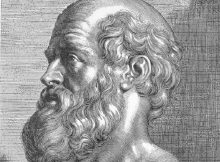Hippocrates was one of the most important figures in medicine, even by modern standards, because he was one of the first people documented to challenge the idea that disease was caused by the gods. The prevailing belief at the time was rooted in superstition, and disease appeared to strike arbitrarily. It was Hippocrates who first viewed the subject of disease through a lens free of religious bias.
Hippocrates was not always right, and operated under the discipline of Humorism. As such, he believed heavily in the importance of bodily fluids, specifically: black bile, blood, yellow bile and phlegm. He was known to make several diagnoses by tasting the urine of his patients, or by smelling their sweat.
However, one important distinction that still causes some debate to this day is his approach to treating disease. Hippocrates viewed a patient’s health as a long term endeavor, so he tended to develop a series of factors that he felt would determine a proper prognosis for a particular disease. This differs from the modern standard of medicine, which places great emphasis on diagnosis and little on the long term outcomes save for terminally ill patients.
In some ways, Hippocratic treatment could be argued to be a meditation on death. It takes a passive approach to patient care, that while providing for greater time to study, does not allow for decisive action.
By today’s standards, Hippocrates is best known as man behind the Hippocratic Oath. The trouble is that there is no historical evidence to support that he ever wrote it. The code serves as a guide of best practices for doctors, but it was a part of the Hippocratic Corpus. The grand manual served as a collection of Hippocrates lectures, case studies, thoughts and student additions.
Phineas Upham is an investor from NYC and SF. You may contact Phin on his Phineas Upham website or LinkedIn page.
